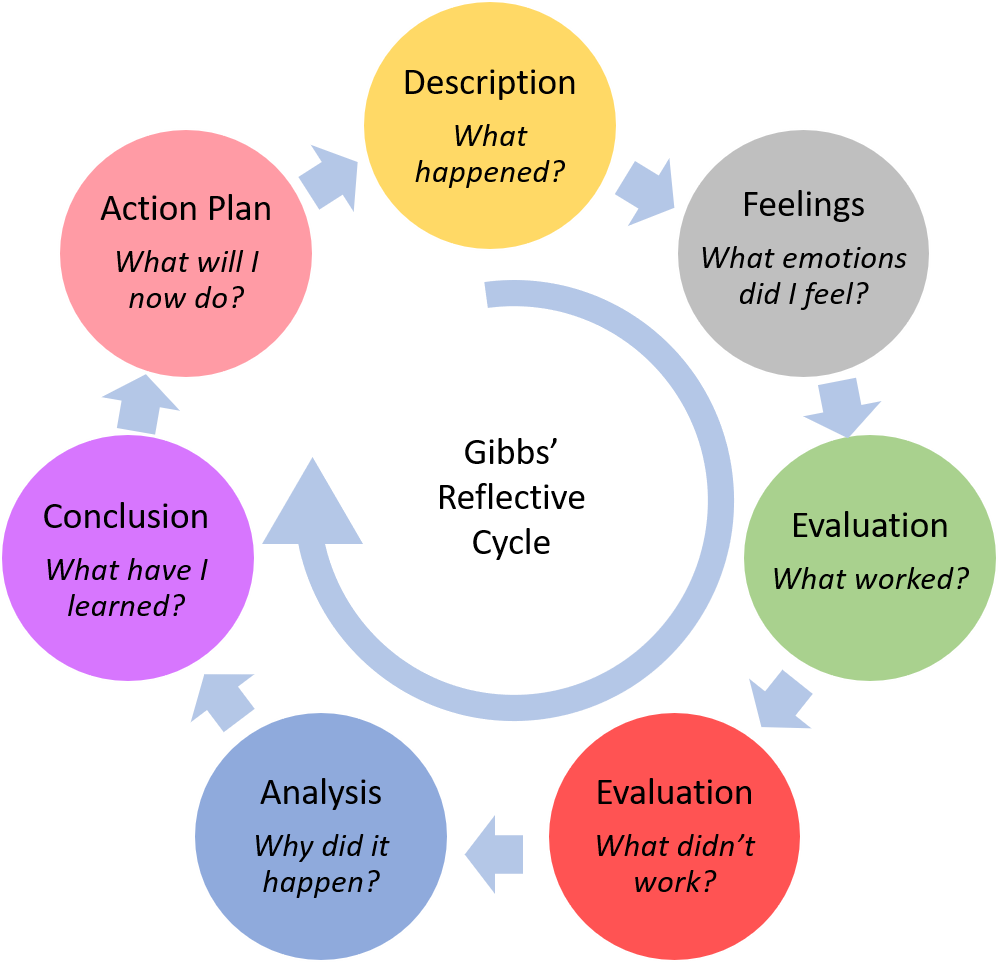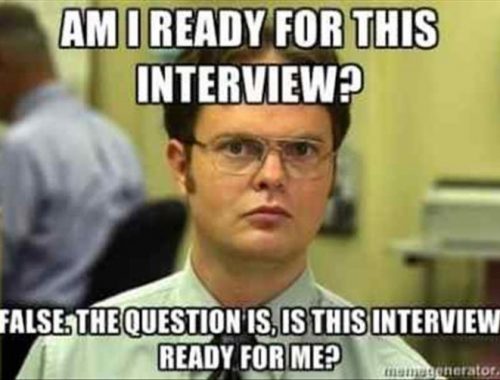Grey Hairs At Twenty? A Reflection On My Simulated Interview
Chills running up your spine, sweat growing in your palms and knots forming in your stomach. You walk into a boxy room filled with people who are already staring into your soul. Was this an interrogation? No, it was a job interview…
[1]

Look familiar?
The all-important job interview. So many of us must go through this lengthy and stressful process if we want to attain our dream job. While the stress of it all makes us believe we will somehow attain wrinkles overnight, it is a process that we must all go through. Fortunately, I was able to go through a simulated interview process within my work-based learning module at Queen’s University Belfast. This gave me crucial interview experience that enabled me to see the structure of a formal interview, as well as solutions to problems that often appear during the interview process. Using Gibb’s reflective cycle as my guide, I will reflect on the experiences of my simulated interview, discussing the lessons that it taught me.
[2]

Filling you in: what happened?
It has been a lifelong dream of mine to become an English teacher. However, in order to get my dream job, I would first have to through an interview first. Luckily, my work-based learning module enabled me to go through a simulated interview process. For the simulated interview, I had to choose a job. I, of course, chose a teaching position for the subject of English at Kingswood Academy. During the interview, my fellow peers asked me a total of four questions based on the job description.

I provided answers to each question, utilising the STAR (Situation, Task, Action, Result) technique on question two, as it required me to give a scenario based answer. After completing the interview, I received an evaluation form. My interviewers pointed out that, while I talked about my experience in great detail, I needed to be a lot more specific within my responses, relating my skills back to particular times during my academic career.
Fervent Feelings: how did I feel?
My feelings of nervousness had been building up since the night before. Essentially, I was a nervous wreck, washed up on the shore of doom. My worries were perpetuated by a fact I had come across: “33% of hiring managers claim to know whether or not they would hire a candidate within 30 seconds of meeting them” [3]. Essentially, my interviewers could have already decided if I was the suitable candidate for the job as soon as I had walked in the room, and I would not know any different. I tried to remain as calm as possible, but it was the fear of the unknown. However, towards the end of the interview, I began to feel more confident.
Looking back: the good and the bad
Importantly, the American National University highlights how “mock interviews are like study sessions that build your ability to perform well and boost your confidence” [4]. This was definitely the case for me, as, after the interview was over, I felt more confident in my ability to answer questions, as I had now gained practise. Additionally, as one of my questions was related to the ethos of the school, I was able to consider how an organisation would want a potential future employee to relate to them and showcase that through their skills and experience. However, during the interview, I did not make my experiences specific enough, and sometimes they were filled with too much detail, which meant that, at times, my responses were not as focused as they could have been.
This is me trying: making sense of it all
Ultimately, “interview nerves affect people in different ways […] For many people, they find in interview situations, they end up talking far too much” [5]. This explains why I was overly going into detail within my answers at the start of the interview. Additionally, I was not specific enough during the interview due to the fact that I did not link my skills and experiences to particular times of my academic career during the preparation process. However, despite the lack of confidence I had, I was still resilient and pushed through to the end because I knew that this interview would help me with my dream of becoming an English teacher. Importantly, “passionate people tend to be more resilient when encountering obstacles” which explains that, while my initial nerves got the best of me, I was still able to push through and answer the questions towards the end with more confidence [6].
There’s something in the air. What do we call it? Accountability: thinking about other things I could have done.
Instead of panicking over the interview, and worrying about my lack of experience, I would have reassured myself instead. This would definitely take away a lot of the nerves I was feeling on the day of the interview. Additionally, I could have asked another person to go over questions with me, which would have enabled me to become more confident when it came to talking about my skills and experience throughout the interview, instead of towards the end.
I survived. How to avoid getting grey hairs in my twenties: my future plan of action
In the future, I will remember that interviews are all part of a learning process. While they may be nerve wracking, you must try and remain confident in your abilities. The biggest fear is failure, but, then again, failing at something is part of a learning process. If we do not fail at things, how will we ever learn? While preparing for future interviews, I will remember not to be too hard on myself. The simulated interview process definitely has given me more confidence in my ability to answering questions and I will take that confidence and showcase it in future interviews.
[word count: 980 words]
Bibliography
[1] INC Magazine. (2016) 5 things you should never say to a stressed-out co worker. Available at 5 Things You Should Never, Ever Say to a Stressed-Out Co-Worker | Inc.com (Accessed 21st February 2023).
[2] Gibbs, G. (1988) Learning by doing. Oxford: Further Education Unit. Available at Gibbs’ Reflective Learning Cycle – HELEN MARTIN BLOG (helendenheld.com) (Accessed 21st February 2023).
[3] StandOutCV. (2022) Job Interview Statistics. Available at Job interview statistics 2023 | UK & Global (standout-cv.com) (Accessed 21st February 2023).
[4] American National University. (2022) 4 Reasons Why You Need to Do a Mock Interview. Available at 4 Reasons Why You Need to Do a Mock Interview | American National University (Accessed 21st February 2023).
[5] Live Recruitment. (2016) How to stop talking too much in a job interview. Available at How to stop talking too much in a job interview · Live Recruitment (live-recruitment.co.uk) (Accessed 21st February 2023).
[6] Investopedia. (2022) Follow Your Passion, and Success Will Follow. Available at Follow Your Passion, and Success Will Follow (investopedia.com) (Accessed 21st February 2023).
You May Also Like

Working with a Production House
30 November 2022
“Fake it ‘til you make it!”: Finding Success in a Simulated Interview
22 February 2023
